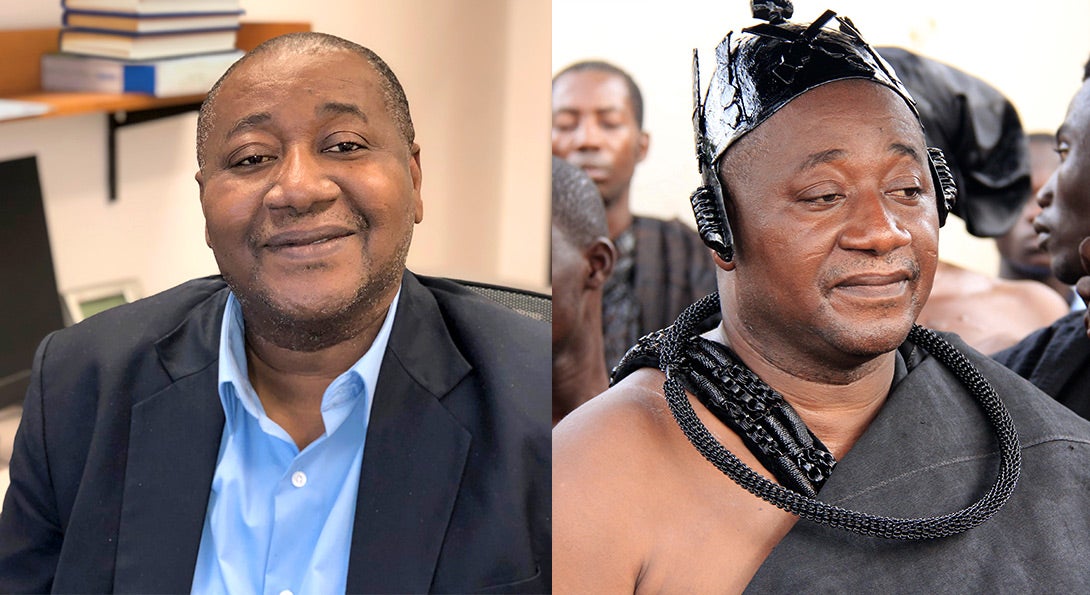Dr. Osei Darkwa: Empowering People at the Intersection of Tradition and Technology

Introduction
There are two unique and remarkable aspects of Osei Darkwa, PhD, who recently joined the Jane Addams faculty: he has been at the forefront of online learning development in Ghana, and he is also a Ghanaian traditional ruler, Chief of Patriensa Traditional Area.
“As chief, people come to you with all kinds of issues, and you need to address their issues and challenges,” Dr. Darkwa says. “You’re dealing with a wide range of real issues, such as family issues, land issues or marital issues. Social work has given me skills to do this.” In his first year of undergraduate study, he was in a sociology program, but switched to social work because, “sociology only identifies issues but doesn’t deal with them. In social work you get your hands dirty addressing real challenges faced by society.”
While in the doctoral program at Washington University in St. Louis, he was working as an assistant for professors doing research in gerontology, which developed and crystalized for him the importance of that discipline. “Older people occupy a different role in the U.S. than they do in Ghana, which is still an emergent country and maintains great respect for the older generation. They are considered to have knowledge and wisdom, and are seen as intermediaries between the living and the ancestors,” he says. “They are always consulted. As a traditional ruler, a chief, I have a council of elders.”
Dr. Darkwa explains that Ghana still has many primary institutions (such as family) that care for older persons, as opposed to formal institutions such as nursing homes in the U.S. “Ghana is an agrarian society, most families are farmers. The country’s raw materials are exported and products imported back in, a colonial sort of model. We want to change that and move to the next level, into manufacturing,” he observes. “But that impacts the culture. People are no longer living in small communities and farming, so the primary institutions like family become disorganized and we must begin looking to formal institutions for elder care.”
There are also policy implications that arise from this kind of socioeconomic development. “Policy is always a powerful tool, and the absence of policy can create a gray area. In Ghana, the government is moving in the direction of something similar to the Older Americans Act in the U.S., to address the needs of older populations,” he says. “People are living longer, so we also need to put in place structures to address their emerging healthcare and social service needs. Especially policies and reform in the area of statutory payments, similar to Social Security in the U.S.”
Discussion of socioeconomic development brings Dr. Darkwa to the topic of his work in technology and online learning. For 10 years, he was the Founding President of Ghana Technology University College (GTUC). “The university was founded in partnership with Ghana Telecom, the national telecommunications company. We founded it from scratch and grew a student population of 9,000 in 10 years,” he says, “offering undergraduate and graduate degrees in Telecommunications Engineering and Information and Communications Technologies.”
The institution implemented several learning models, including mixed mode learning and the innovative transnational education model. “Technology was at the heart of everything we did, and our transnational learning model was new in Ghana and raised the ability of the school,” he says. “We knew we couldn’t offer all programs students were looking for, so we partnered with universities around the world to allow students to access that variety of programs.”
Dr. Darkwa also founded and was president of African Virtual Campus, which provided students access to online programs directly from academic institutions offering those programs. “It was the first centralized and shared service facility, aggregating programs to make it a one stop place for students looking for access to online programs,” he explains. “We also had internet enhanced tablets for people in remote areas, so they could connect to online coursework through a learning management system.”
He is optimistic about the use of technology, not only in the classroom but for social work practice and research. “In social work we see all kinds of clientele, and almost all of them have access to connected devices which can be used to enhance practice,” he says. “There are many new tools for data collection and analysis, and social work informatics is an interesting and emergent field. So there is great potential for facilitating new research and enhancing social work practice.”
Dr. Darkwa holds an abiding belief in community, teamwork and the constructive and empowering use of technology. “No one has a monopoly on ideas; we all have our own strengths and limitations and weaknesses. But once we come together we are able to achieve a better outcome for society,” he observes. “I see this in my function as a chief. People say they think I am more understanding and accommodating as a chief, because I empathize and try to understand their issues. I want to empower them and find long-lasting solutions.”
As a Visiting Clinical Associate Professor at Jane Addams, Dr. Darkwa teaches Critical Social Work in a Multicultural Society, Social Work Research, and Behavior and the Social Environment, and also provides consultation on the use of digital technology for instruction.